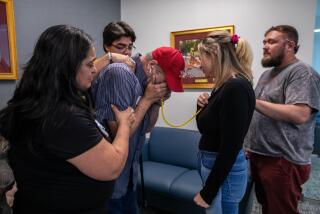Transplants: Only Donor Shortage Hampers Science
- Share via
PITTSBURGH — Transplant surgeons expect to be able to replace almost every part of the human body during the 1990s, but they fear that such medical feats will have little impact unless more people donate organs.
“I see another decade of progress equal to the last decade, but that won’t happen until we figure out the organ donor problem a little bit better,” said the University of Iowa’s Dr. Robert Corry, president of the United Network for Organ Sharing.
Organ donation has been at a standstill the last few years, despite laws requiring hospitals to discuss the subject with relatives of brain-dead patients.
“One of the goals is that one of these days organ donation will be viewed as commonplace as giving blood,” said Linda Sheaffer, director of the federal Division of Organ Transplantation.
“Can we achieve that in the 1990s? I’m just not sure,” she said.
Doctors hope to ease the crunch in the ‘90s by transplanting animal organs into humans. Such a cross-species transplant has not been attempted since 1984, when California surgeons put a baboon’s heart into a 12-day-old girl. She died 20 days later.
Advances also are expected in the quest for artificial organs, especially heart-assist devices, that can be implanted permanently.
Less flashy, but no less important, are efforts to attain long-term transplantation success without anti-rejection drugs that suppress the patient’s entire immune system, and to extend the shelf life of donated organs.
Doctors are working to perfect pancreas, lung, intestinal and reproductive organ transplants and to replace limbs with cadaver parts.
About the only irreplaceable part seems to be the brain.
“It’s a question of identity,” said transplant pioneer Dr. Thomas Starzl of the University of Pittsburgh. “If you found a body for the brain, you’d transplant the body to the brain. It’s a subtle distinction. I wouldn’t have any plans for that.”
Whatever the advances, however, the flow of donor organs may remain a problem.
“The whole thing would be revolutionized overnight if you could do something about that,” Starzl said. “When there’s a crack in that wall, it’s going to be like the Atlantic Ocean pouring through.”
Studies show that almost all Americans are aware of organ donation and view transplantation favorably. But only a slight majority express willingness to give loved ones’ hearts, livers, kidneys and other vital parts so others may live. Fewer still want their own organs donated upon death.






